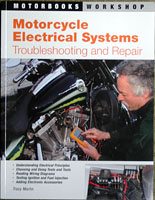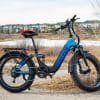ISBN: 0760327165
Dimensions (in cm): 27 x 21
Publisher: Motorbooks (MBI Publishing), 2007
159 pages, many color photographs, sketches and illustrations.
Tracy Martin is a motorcycle Renaissance Man. He’s a regular contributor to Motorcycle Consumer News, RoadBike and Friction Zone magazines. He was the co-author of the Motorcycle Safety Foundation’s training book “Motorcycling Excellence“.
When he’s not writing, Martin is teaching advanced motorcycle riding skills through Lee Parks’ “Total Control” workshops. On top of all that, he’s a National Institute for Service Excellence (A.S.E.) Certified Master Technician, a service writer and an automotive consultant.
So let’s just say that he knows motorcycles, he knows how to ride them and he knows how to fix them.
Motorcycle Electrical Systems Troubleshooting and Repair is a follow-up to Martin’s first book, “How to Diagnose and Repair Automotive Electrical Systems”, also published by Motorbooks International.
Mr. Martin sent us a copy of the new book, just published in January 2007, probably because he has discovered from visiting webBikeWorld that I’m an electrically challenged motorcycle mechanic. Give me a problem involving metal and grease and I’ll fix it, but when it comes to electricity, I get that weird stumbling numbness in my brain — the exact same one I got during High School Algebra class.
Anything that can help me overcome this disability is welcome. In his preface, Martin states that he hopes that the reader of the book will be “able to gain some practical skills and knowledge which will help increase your confidence when … faced with motorcycle electrical challenges.” Doesn’t that sound exactly like the cure?
So let’s get to the bottom line here: I think Martin’s goals have been met; that is, I do think I now have some practical skills at diagnosing motorcycle electrical problems; I do understand more about motorcycle electrical systems and how they work; and I do have more knowledge about electricity in general. Whether or not this will increase my confidence is another matter…
But I have to admit that none of this came easy. Although I consider myself to be pretty sharp on many subjects (for example, I finally struggled through the math I needed in High School and beyond), my brain is just not wired to easily comprehend topics like the relationship between Volts, Amps and Ohms. In the end, these relationships are something I must first memorize, then turn them over and over in my head while talking myself through the words until I feel comfortable with the concepts and understand how to apply them.
Motorcycle Electrical Systems Troubleshooting and Repair is loaded with information, color photos, diagrams and sketches that definitely helped me. But this isn’t lightweight reading, at least for me. It takes some dedicated time and focus to absorb it all.
The first chapter covers the basics of electricity — or at least the background topics that are necessary to understand motorcycle electrical systems. Chapter 2 starts the motorcycle-related information, with Voltage Drop Testing. We then learn about Electronic Testing Tools in Chapter 3; Batteries in Chapter 4; then Charging and Starting Systems, Ignition Systems and then Fuel Injection Systems (hey, they need electricity too you know!).
Chapter 8 has something I’ve been wanting to see for a long time: how to read a wiring diagram. Finally, after all that, we get into the real meat of the book with Troubleshooting Electrical Systems in Chapter 9 and the fun starts in Chapter 10 with Electrical Accessories, probably the real goal for any motorcyclist reading this book.
My advice is to buy a copy of the book and read through it slowly, taking the time to study the illustrations and understanding the concepts. Since most of us have only an occasional need for motorcycle electrical troubleshooting or repair, I don’t think we need to be full-time experts in the topic, with all of the facts and figures at our fingertips.
What’s important is to use the book to develop a basic knowledge of electricity, how it works and how it helps our motorcycles live and breathe. Then when the time comes, I think it’s reasonable to expect that with a little brushing up, you’ll be able to solve many of the electrical mysteries that would have stumped you in the past.
Motorcycle Electrical Systems Troubleshooting and Repair is a tool that can be used to improve your breadth of knowledge regarding motorcycle maintenance and repair. It’s the best book I’ve read so far on understanding electricity as it relates to motorcycles, and for that reason, it’s highly recommended.
wBW Rating:
![]()
![]()
![]()
![]()
![]()
![]()
![]()
![]()
The wBW “Flaming Helmet” Book Review Rating System | Book Reviews Home | All Reviewed Books Ranked by Rating



